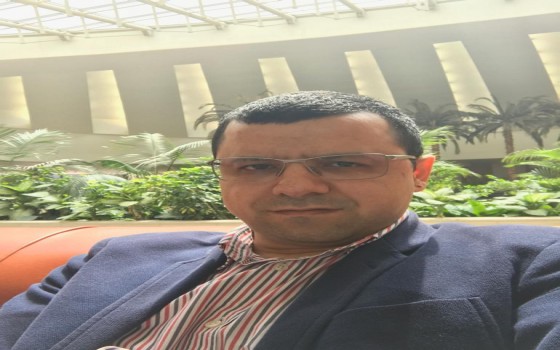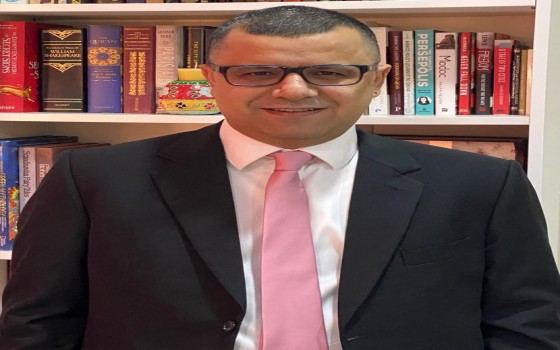
On the anniversary of her passing.. Umm Kulthum.. Egypt's immortal voice in the heart of the world's civilizations.. By the writer Mustafa Kamal Al-Amir

- Europe and Arabs
- Monday , 3 February 2025 17:10 PM GMT
On the half-century anniversary of the death of the Lady of Arabic Singing, Umm Kulthum, on February 3, 1975.. Umm Kulthum "real name Fatima" was nicknamed "Star of the East", "Sit" "Thoma"
Fatima, daughter of Sheikh Ibrahim Al-Sayed Al-Beltagy, the village muezzin, was born on December 31, 1898 in Tamai Al-Zahaira, Sinbilawein, Dakahlia Governorate in the Nile Delta, northern Egypt.. The pinnacle of Egyptian singing in its golden age with the giants of art Mohamed Abdel Wahab and Abdel Halim Hafez with Farid Al-Atrash and his sister Asmahan.
Umm Kulthum is the greatest singer to appear in Egypt in the modern era and one of the strongest voices in the world
Until she became an artistic symbol for all of Egypt in the countries of the West, Europe and America, even the Far East
After she sang at the Olympia Theater in Paris and many Arab cities in support of the army and the Egyptian state before the victory, she was afflicted with illness and thyroid gland, which caused her to wear sunglasses even in her night concerts
At dawn on January 30 1975, Umm Kulthum was transferred from her villa in Zamalek "before it was demolished" to the Armed Forces Hospital in Maadi; after she fell into a coma due to a head hemorrhage, a deterioration in her kidney condition, and heart complications.
All the news indicated that her departure was imminent, even the official radio made a grave mistake by announcing Umm Kulthum's death on February 1st before the hospital rushed to issue a statement denying the news of her death, after which the rumors began, accompanied by the concern of the Egyptians and the Arab world for her health.
On February 5th, 1975, the last meeting with Umm Kulthum took place and the beautiful farewell to an exceptional artist. It was a solemn funeral attended by millions of Egyptians, and attended by many kings and presidents of Arab countries.
Like the funeral of the late leader Gamal Abdel Nasser on September 28, 1970.
Umm Kulthum's coffin arrived at Omar Makram Mosque in Tahrir Square, and weeping filled Egypt and the Arab world, the condolences, in which most of the famous reciters in Egypt at the time participated.
The year following her passing, the Egyptian Ministry of Culture held a memorial service for her, in which many artists and celebrities participated, headed by President Mohamed Anwar Sadat. The poet Ahmed Rami recited his last poems in mourning for the companion of the path and success, saying in them: "It never crossed my mind that I would mourn her after what I composed of her most sorrowful songs. I used to hear her sing and it delighted me, and today I hear myself crying and making her cry." Egyptian artistic works were produced about her, including the film "Planet of the East" in 1999 about her life story, starring Fardos Abdel Hamid. And the series "Umm Kulthum" in 1999 about her biography, starring Sabreen. She also sang in London in 2020 using hologram technology in a musical theatrical performance about Umm Kulthum at the famous Palladium Theater. While Umm Kulthum herself acted in six films, the first of which was the film "Wedad" in 1937, then "Nasheed Al-Amal", "Dinars", "Aida", "Salama" and "Fatima", her last film. She also sang about 320 songs, and her song "Al-Atlal", lyrics by Ahmed Rami and music by Riad Al-Sunbati, was classified among the best hundred songs produced in the twentieth century. The Museum of World Civilizations, east of Amsterdam, the largest city in the Netherlands, collects the history of the world's tribes and civilizations in all cultural and civilizational fields. It also documents the history of slavery that flourished with the discovery of the New World in the continents of North and South America. These are black pages made by European slave traders from West Africa to America, and millions of them died while being shipped by sea and thrown into the waters of the Atlantic Ocean. What surprised me in this huge museum with the periodic change of the exhibits in it. However, there is a permanent wing on the first floor about the planet of the East, Umm Kulthum. It collects pictures and statues with audio media to listen to the songs of the immortal voice of Egypt. Even fifty years after her death, she is alive and immortal with her high-end art and sweet voice that has not been repeated to date in all of our Arab homeland from the ocean to the Arabian Gulf.












No Comments Found